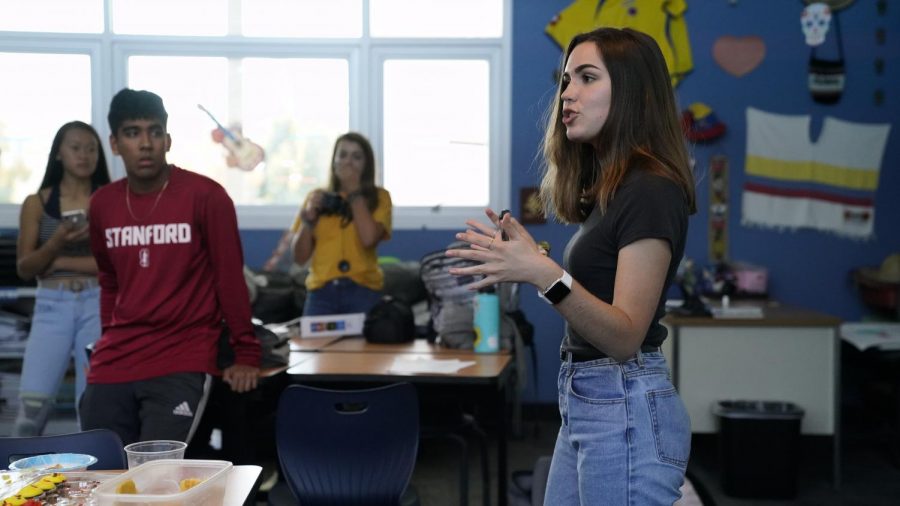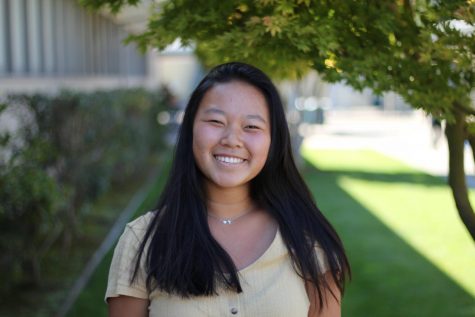Elena Mujica: Spreading hope and supplies to Venezuela
Junior Elena Mujica celebrates the success of the recently founded club Viva Venezuela’s boba fundraiser and discusses the club’s next steps with the members. The club has sent about 400 pounds of supplies to her aunt who is a local doctor in Venezuela, despite the strict government policies.
November 8, 2018
The last time junior Elena Mujica visited her home country Venezuela was eight years ago. She remembers staying with her grandparents as a child and sitting in their living room where she could see a beautiful view of the city, drinking the guanabana smoothies her grandmother used to make for her and going to the beach with her grandfather.
Since that time, the country has become too dangerous for Elena to go back. Under the rule of Hugo Chávez followed by Nicolas Maduro, Venezuela became a dictatorship. As crime grew worse, many of her family members were held at gunpoint and knifepoint and her aunt was blacklisted for protesting the dictatorship.
Because there have been severe shortages in medicine, medical supplies and food staples in the recent years, Elena founded the Viva Venezuela club this year Venezuelan citizens. Their goal is to successfully deliver medical and school supplies to her network of family in Venezuela. From there, the supplies can be delivered to The Luis Razetti Hospital, where her aunt works, as well as programs in the city that help kids in the slums.
“Their parents can barely afford to feed them, especially given the crisis there, so it helps get them school supplies so that they can still have an education,” Elena said. “The government, because it doesn’t want to appear weak, refuses to acknowledge the problem. Meanwhile, there are grocery stores with no food.”
During her freshman year, Elena started to explore the crisis in Venezuela. In World Studies, she wrote a paper on the right to healthcare in Venezuela.
“I had been kind of curious about why we hadn’t been back to Venezuela and why it was such a mess…because I hadn’t heard much from my family and no one ever sat down and [talked to me about it],” she said.
While researching for her paper, she found out that a majority of the Venezuelan economy was based off the oil industry. She said the government modified price control laws in ways that set up Venezuela for failure when the economic recession hit in 2014. The price of oil dropped by over half, and because revenue decreased, the Venezuelans became more dependent on imports.
After writing her paper, Elena was not ready to move on from what she learned. She wanted to do something about the crisis in Venezuela. In sophomore year, she was very involved with her church and proposed delivering supplies to Venezuela as a church service project. With the help of friends from the Do Something Club, she hosted a school drive at Los Altos that garnered about 400 pounds of supplies. After she contacted her aunt, she flew to Miami during spring break and brought the supplies with her, and she was able to successfully deliver them to Venezuela.
According to Elena, Miami has a high Venezuelan population and many Venezuelan shipping companies. These small companies have boats that can send supplies down to Venezuela. However, Elena still faces challenges in getting supplies delivered. Illegal foreign funding can lead to individuals or organizations being prosecuted for treason. Because of this, Elena and the rest of her team have to be careful to not violate the system.
“It’s really hard to get things to Venezuela because the government has been really reluctant to let in donations,” Elena said. “One time we had [a person] who was going to help us get [our supplies] from Miami to Venezuela and he bailed on us at the last minute. That set us back two months because we had to get it to the shipping company, and shipping by sea takes a month.”
Even with barriers setting her back, Elena knew that she had to continue her project. Inspired by the positive response her previous school drive received, she created the Viva Venezuela club in junior year with a few of her friends. The club, with 25 members now, gradually grew as more people were invited to join. People who joined the club contribute to Elena’s pursuits without having any connection to Venezuela.
“It’s not like we have a trip to Venezuela like the Haiti Club or ODFL because that’s a huge way for them to connect with what [the members are] doing,” Elena said. “For us, we don’t have that because it’s so unsafe.”
Elena wants to make up for lack of tangible progress by motivating club members with updates from her aunt, who sends pictures of the supplies being handed out. Elena wants her club to continue after she leaves and hopes that the club will be able to expand outside of Los Altos.
“By the end of the [school] year, probably April, we’ll have everything shipped to Venezuela,” Elena said. “That’s the goal.”





